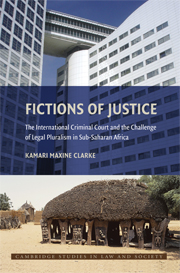 Fictions of Justice
Fictions of Justice Book contents
- Frontmatter
- Contents
- Preface
- Acknowledgments
- Introduction: The Rule of Law and Its Imbrications – Justice in the Making
- PART ONE THE PRODUCTION OF LIBERALIST TRUTH REGIMES
- PART TWO THE RELIGIOUS POLITICS OF INCOMMENSURABILITY
- 4 “Religious” and “Secular” Micropractices: The Roots of Secular Law, the Political Content of Radical Islamic Beliefs
- 5 “The Hand Will Go to Hell”: Islamic Law and the Crafting of the Spiritual Self
- 6 Islamic Sharia at the Crossroads: Human Rights Challenges and the Strategic Translation of Vernacular Imaginaries
- Epilogue: Toward a Critical Transnational Legal Pluralism
- Notes
- Bibliography
- Index
- CAMBRIDGE STUDIES IN LAW AND SOCIETY
6 - Islamic Sharia at the Crossroads: Human Rights Challenges and the Strategic Translation of Vernacular Imaginaries
Published online by Cambridge University Press: 23 January 2010
- Frontmatter
- Contents
- Preface
- Acknowledgments
- Introduction: The Rule of Law and Its Imbrications – Justice in the Making
- PART ONE THE PRODUCTION OF LIBERALIST TRUTH REGIMES
- PART TWO THE RELIGIOUS POLITICS OF INCOMMENSURABILITY
- 4 “Religious” and “Secular” Micropractices: The Roots of Secular Law, the Political Content of Radical Islamic Beliefs
- 5 “The Hand Will Go to Hell”: Islamic Law and the Crafting of the Spiritual Self
- 6 Islamic Sharia at the Crossroads: Human Rights Challenges and the Strategic Translation of Vernacular Imaginaries
- Epilogue: Toward a Critical Transnational Legal Pluralism
- Notes
- Bibliography
- Index
- CAMBRIDGE STUDIES IN LAW AND SOCIETY
Summary
SAFIYA HUSSAINI AND AMINA LAWAL
Safiya, as she has been popularly called, was an unemployed and divorced thirty-year-old Muslim mother of four when she was sentenced to death on October 9, 2001, by a Sharia court in Gwadabawa, Sokoto State, in northern Nigeria. She had been found guilty of adulterous involvement (covered by the Arabic word zina) with Yakubu Abubakar, an older neighbor. The act had apparently led to Safiya Hussaini's pregnancy. Abubakar denied paternity and was acquitted for lack of evidence. (Safiya would later claim she had been pressured into accusing Abubakar of raping her and that the actual father was her ex-husband.) The trial court judge, Muhammad Bello Sanyinawal, ruled that the defendant had confessed to adultery and was therefore already guilty before the court. As discussed in Chapter 5, the criminalization of adultery remains a central tenet of the new Sharia in northern Nigeria; under Islamic law, the crime may be punishable by death.
BAOBAB for Women's Human Rights, a Nigerian nongovernmental organization whose name was taken from a common baobab tree in the region, had been active in trying to influence Sharia verdicts since 1999, contacted Safiya and mobilized around her case; other NGOs, such as the Nigeria-based Women's Aid Collective, also got involved in the legal process. Safiya's appeal was heard at Sokoto's Sharia Court of Appeal on October 26, 2001.
- Type
- Chapter
- Information
- Fictions of JusticeThe International Criminal Court and the Challenge of Legal Pluralism in Sub-Saharan Africa, pp. 206 - 234Publisher: Cambridge University PressPrint publication year: 2009
